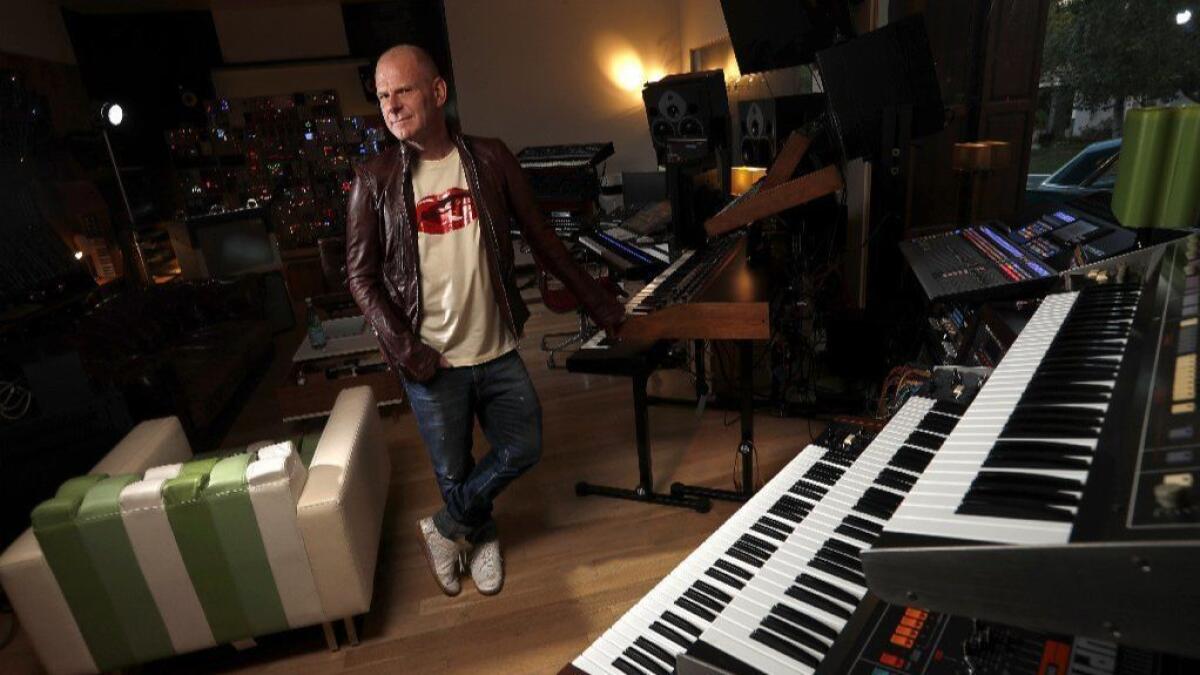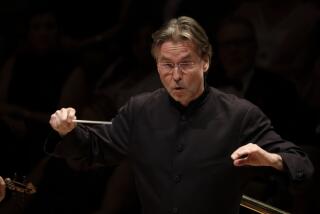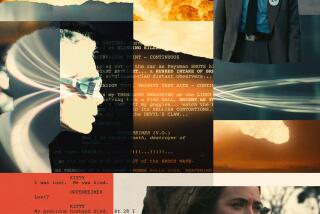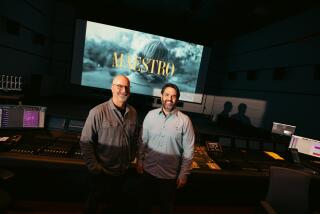Tom Holkenborg’s journey from dance floors to Hollywood royalty
When Tom Holkenborg arrived in New Zealand to work on the score for one of his recent films, he set up in a warehouse next door to the set and filled it with garbage.
Well, not trash exactly, but a hangar full of leftover pipes and cables and scraps of metal and anything from the set that might make an interesting noise. To capture the sound of the film, in this case the dystopian action movie “Mortal Engines,” Holkenborg went straight to the source: the materials used to craft the picture.
“They walked in and saw me making all that noise and were like ‘You’re crazy,’ ” Holkenborg said. “I said ‘No, it’s going to be great.’ ” He pulled up an iPhone video of him thwacking an oil drum to build to an ominous crescendo. “I just started banging on it and throwing stuff around. It starts super quiet but then it gets super loud.” Indeed it did.
Holkenborg’s career as a composer is built on those moments. He’s used such unusual compositional techniques to become not only an in-demand film composer — he conceived the percussive pyrotechnics of “Mad Max: Fury Road” — but one that’s reshaping the art form. He’s on a path to become as influential as Hans Zimmer, his onetime mentor and collaborator.
Directors used to turn to full orchestras or more traditional means of creating big sweeps of drama. But Holkenborg embodies a new era of composers, equally fluent in traditional arrangements, electronics and modern sound design, and capable of delivering a world-crushing backdrop in a matter of weeks.
After writing the thunderous music for “Mad Max: Fury Road” and the winking ’80s synth-pop in “Deadpool,” he’s taking another stab at cerebral action with the forthcoming “Alita: Battle Angel,” directed by Robert Rodriguez (and a longtime passion project of producer/writer James Cameron, of “Titanic” and “Avatar”).
It’s a significant second act for the Dutch-born producer who, as the DJ Junkie XL, was a fixture in the electronica scene of the ’90s and 2000s. But now, even more are watching and listening.
“Alita” is an extremely stylized manga adaptation with a relentless, eerie futurism (the title character’s eyes are exaggerated to the point of the uncanny). Yet director Robert Rodriguez knew it a needed a heart to balance out that side. Holkenborg gave him both.
“There’s nothing more exciting than hearing new sounds and textures from Junkie’s self-built arsenal,” Rodriguez said. “His production gives even his orchestral work a fresh spin, so it does appeal to those who want something bold and exciting, and he’s got the experience and chops to masterfully weave between them all.”
Holkenborg’s studio, in the deep San Fernando Valley, looks more like a NASA mission control center than a recording space. The walls are lined floor-to-ceiling with flickering modular synthesizers, filters and effects racks that can mangle any signal beyond recognition (or just spice it up). His desk is surrounded by rare vintage synths that could make a producer bite a hole through a Moog with envy.
“Sometimes I sit in the backyard with a cup of coffee, and it’s like, man, your life is like so incredibly blessed,” Holkenborg said. “But what’s very important that I understand from these directors is that they feel like they really want to push the envelope. What’s possible with filmmaking?”
Holkenborg’s studio isn’t exactly a one-man shop (he has assistants and collaborators), but it is remarkably self-contained for a composer responsible for some of the biggest sounds in contemporary film. Think of the humid South Seas dread of “Tomb Raider” or the doom-stricken taiko drums that signal impending carnage in “Fury Road” (not to mention that flame-throwing guitarist). All this noise from this one room in a leafy suburban neighborhood.

“I’ve been privileged to work with some wonderful composers, and I’ve learned so much from them. With Tom it was a master class,” said George Miller, the “Fury Road” director. “He has a scholar’s mind. He studied law, taught music and sound design, and has a fierce, wide-ranging intellect. I guess he’s a kind of musical omnivore. But none of this gets in the way of an agile and powerful artistic intuition.”
Much of this was honed in his life as Junkie XL, where he first developed his omnivorous approach to synths and samples, combining elements of rock, breakbeats, techno and synth-pop into a crowd-pleasing sound that took him all over the European rave circuit (he even notched a chart-topping pop single, with a remix of Elvis Presley’s “A Little Less Conversation”).
He dabbled in film work, with tracks appearing in “The Beach” and “Blade,” but the roles began shifting after he moved to L.A. in 2003. Slowly, film composing proved both more interesting and more lucrative, and he all but retired Junkie XL after 2012’s LP “Synthesized.”
For him, leaving behind the life at the front of the stage for the studio wasn’t a sacrifice at all.
“Now in retrospect, I can see I was never supposed to just be an engineer or a producer. I was never supposed to be an artist just on my own. I can only say this now looking back that I felt shackles,” Holkenborg said. “There was always this internal fight whether I could deliver what I wanted but then also satisfy fans. It wasn’t until I started doing films that I really felt like a fish in the water.”
While it took him a decade and a half to settle into this new role, Holkenborg’s DJ career gave him an edge in composing. Having honed his skills in treating and re-shaping samples in his DJ career, his sounds have the gravity of peers like Zimmer but with a malleability that can enhance all sorts of moods and settings. He’s become known for big-budget action franchises and indeed has a preternatural talent for creating tension in that setting.
“The best thing about working with Tom -- aside from his immense talent — is the pure enthusiasm he brings to the work,” said “Deadpool” director Tim Miller. “And I’m talking about the pure, childlike glee that he has when digging into the work. He’s just so excited — and it’s mostly about the opportunity to do something new and different. His first suggestions are usually way, way out there, but in the best possible way.”
From the witty “Miami Vice”-style throb of his “Deadpool” score to the quiet menace of “Black Mass” and the ruminative “Brimstone,” his range is much deeper than his biggest credits might suggest.
Studios and directors have dabbled in letting electronic acts take the reins of big projects — see Daft Punk’s score for “Tron” or M83’s work for the Tom Cruise sci-fi epic “Oblivion.”
But some of those results have ended up as a diluted version of the artist’s aesthetic, shoehorned into a big-budget film. Holkenborg feels that now, by embracing his role as an artisan in service of a director’s vision, his work feels more authentic than it did when he was a solo producer.
And he’s not afraid to let viewers in on his process. One of his favorite pet projects is his YouTube series “Studio Time,” where he walks viewers through some basics of composing and sound design from the captain’s chair in his studio.
The sessions are approachable and even funny, and any aspiring producer will glean something useful from them. Rather than take away from the drama of a huge action flick, the series shows how one of film music’s most formidable minds makes all those new sounds and twists them to his necessary ends.
“I love to make music, which is my heart, my soul, my everything,” he said. “ But for me, [education] is such a beautiful thing and for me that’s even more rewarding than actually making music on my own.”
As Holkenborg unscrewed an old drum machine, his eyes lit up as he told the story of how he tracked down long-discontinued chips to breathe new life into it for “Deadpool.” He fired up the score on his computer and true enough, the weird little machine gave the music a vintage edge that cut through the bombast. He made something the size of a dinner plate feel like an orchestra, all from the couch in his living room.
“Just figure it out on your own,” he said, turning the machine over in his hands. “You want to leave that magic intact.”
More to Read
The biggest entertainment stories
Get our big stories about Hollywood, film, television, music, arts, culture and more right in your inbox as soon as they publish.
You may occasionally receive promotional content from the Los Angeles Times.







